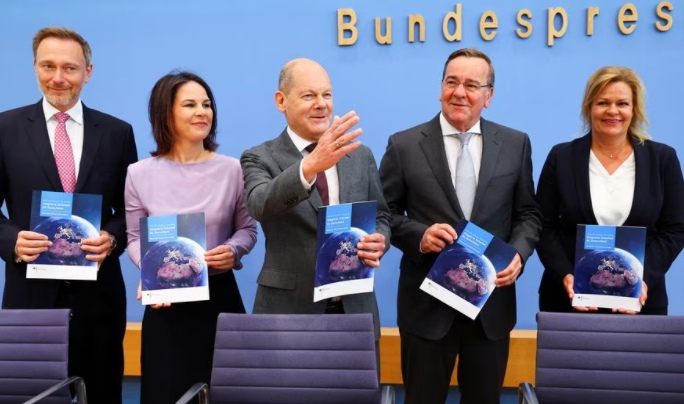Has war in Ukraine affected the thinking of politicians in Berlin? Have they really understood that Germany must strengthen its own resilience and defence on all fronts, as it may be in the crosshairs of a superpower? The answer is not, according to CarnegieEurope.
The government of the traffic-light coalition periodically uses the rhetoric of Zeitenwende and lists measures of German support for Ukraine. However, this all looks like fulfilment of an obligation rather than a new strategic beginning.
Of course, there are two Bundestag MPs who are trying to get the Chancellor to authorise the production of Taurus cruise missiles, as was previously the case with German battle tanks and air defence systems.
But the Kiesewetters and Strack-Zimmermans (member of the Foreign Affairs Committee for the Christian Democrats and chairman of the Defence Committee for the Free Democrats, respectively) have not found support on the German foreign policy scene. Most Bundestag deputies do not participate in discussions on Europe-Russia relations.
There is no clear strategy because of Chancellor Olaf Scholze and his supporters from the Social Democratic Party (SPD). Since the outbreak of hostilities in Ukraine, they have opposed Germany’s involvement in the war and have called for escalation to be kept under control.
But what escalation control? As if the German government could stop for a moment the killing and wounding of civilians, the multiple destruction of homes and infrastructure. No, this policy of German non-intervention will not be able to stop the avalanches of destruction, grief and tears on the territory of Ukraine.
The situation is diametrically opposed: The fact that the SPD leadership continues to favour peace talks, while Putin has ideological associates in the far-right German party Alternative for Germany (AfD), can only be to the Kremlin’s advantage.
Scholz does not want to be the one to allow Ukraine’s defeat, neither does he want to bring Russia to its knees. In other words, there is no clear attitude towards the situation vis-à-vis Moscow.
The Chancellor believes that a unipolar world cannot be allowed to emerge if Russia wins. However, how is he going to prevent this?
Would Scholz’s office want Russia to suffer too clear a military defeat? Political analysts point out that such a scenario could lead to dangerous domestic political upheavals, which in the worst case would lead to uncontrolled disintegration of Russia. Perhaps we should wait for a more appropriate moment for negotiations. When will it be? Maybe after Putin is re-elected as Russian president on 17 March 2024? By then, Ukraine will no longer have the resources to continue the war and will be more willing to sit down at the negotiating table. After all, negotiations have to start at some point, don’t they?
That’s where Germany is stuck. Berlin still does not spend at least 2% of GDP on defence as promised to the allies.
At the NATO meeting in Vilnius, Scholz said that his government was ready to put Germany’s defence capability on a sound footing. It has not escaped the allies’ attention that the massive structural and financial changes announced will not be realised. They wonder how the severely underfunded Bundeswehr can improve its combat capability and combat readiness while fulfilling its allied obligations.
If the Social Democrats still haven’t realised that the outcome of the war in Ukraine will have an impact not only on the future affiliation of Crimea and Donbas, but on something more global in the world, the other two members of the traffic light coalition – the Greens and the Liberals – should think about going beyond their election tactics.
Only by using a credible and long-term deterrence strategy can the West limit Russia’s range of action. A look at George Kennan’s 1946 “Long Telegram” can provide important food for thought about what a neoconservative deterrence strategy coordinated with NATO allies might look like.
The U.S. has already started discussing a deterrence strategy. For example, such well-known strategists as former U.S. Secretary of State Condoleezza Rice and historian Niall Ferguson, as well as former NATO Deputy Secretary General Alexander Vershbow have spoken about it.
Here in Germany, a modest start would be made if the Greens and Liberals, supported by the Christian Democrats, said loud and clear: Germany is no longer surrounded by friends. It has a veritable adversary in Russia, but it will do everything to defend the democratic order against it and actively help to defeat the regime in Moscow. For Germany, European security does not end at the NATO borders.
